
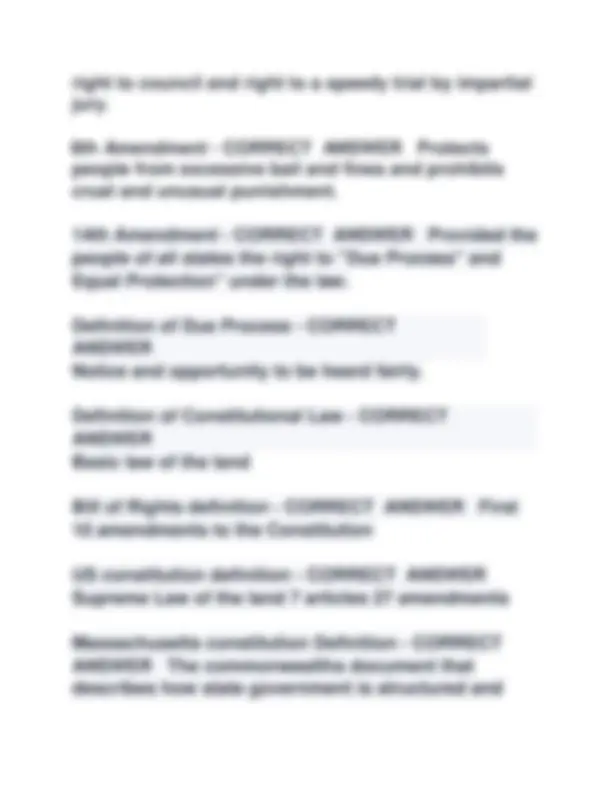
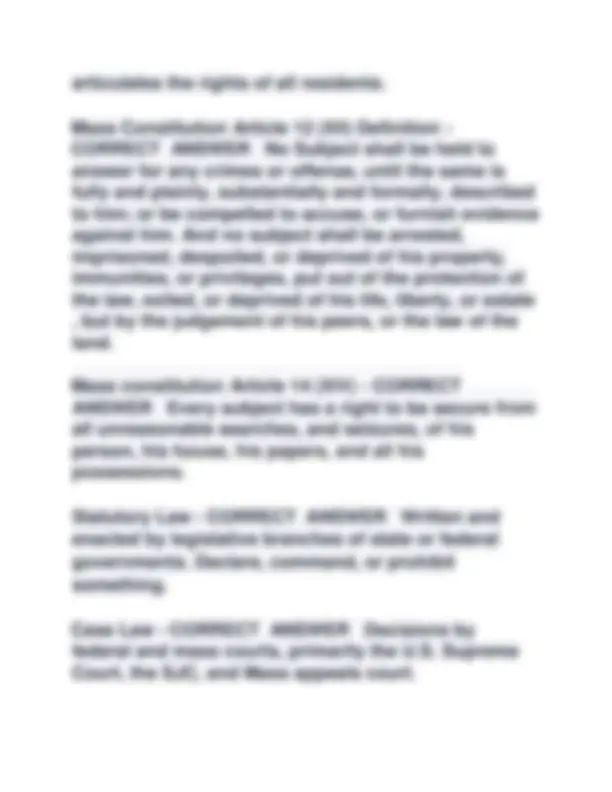
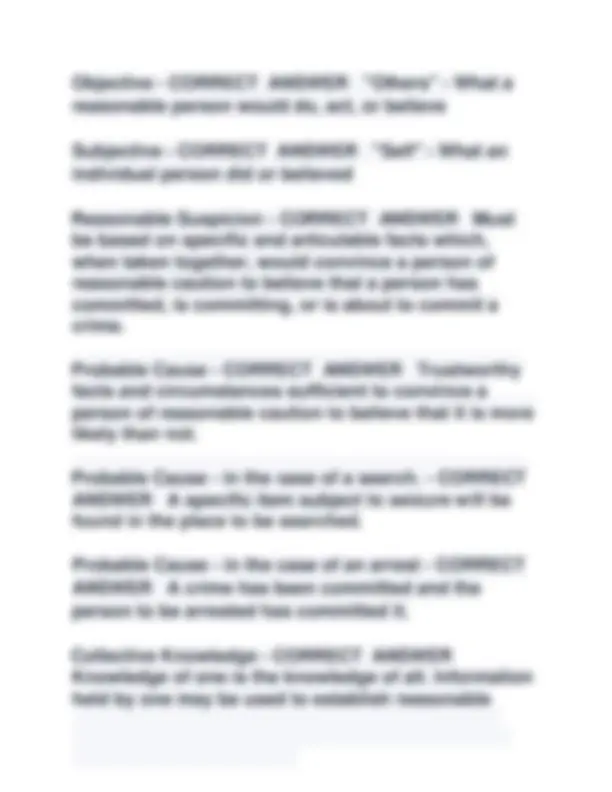
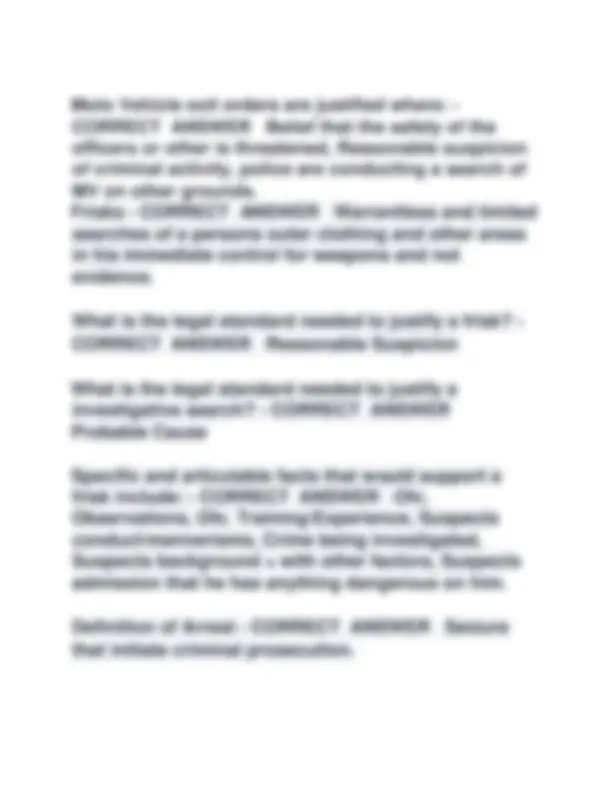
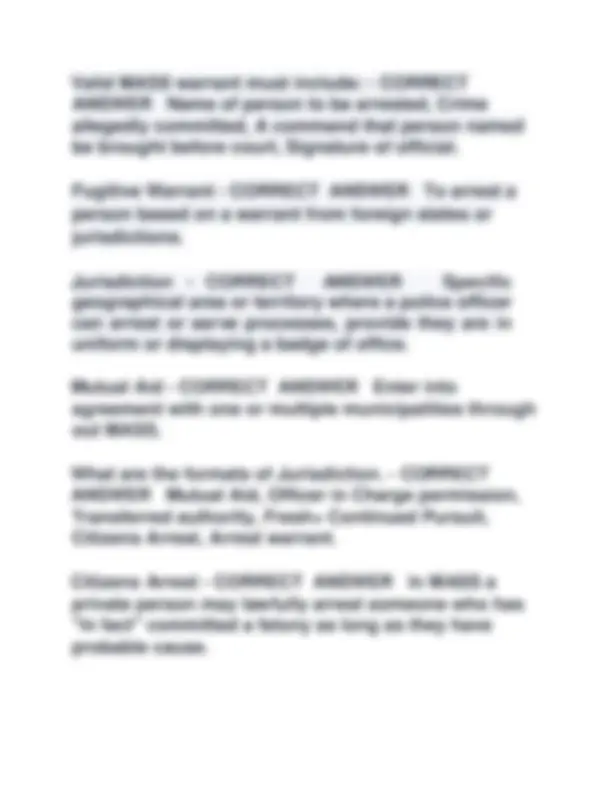
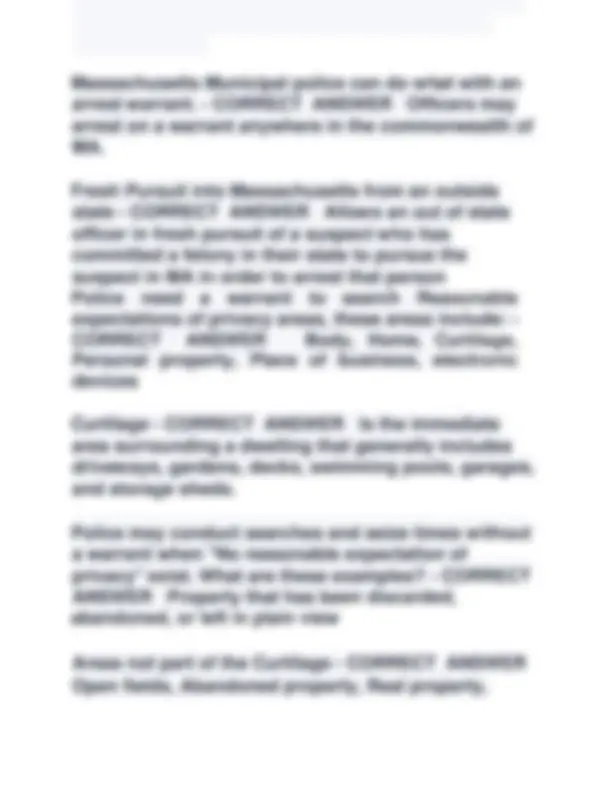
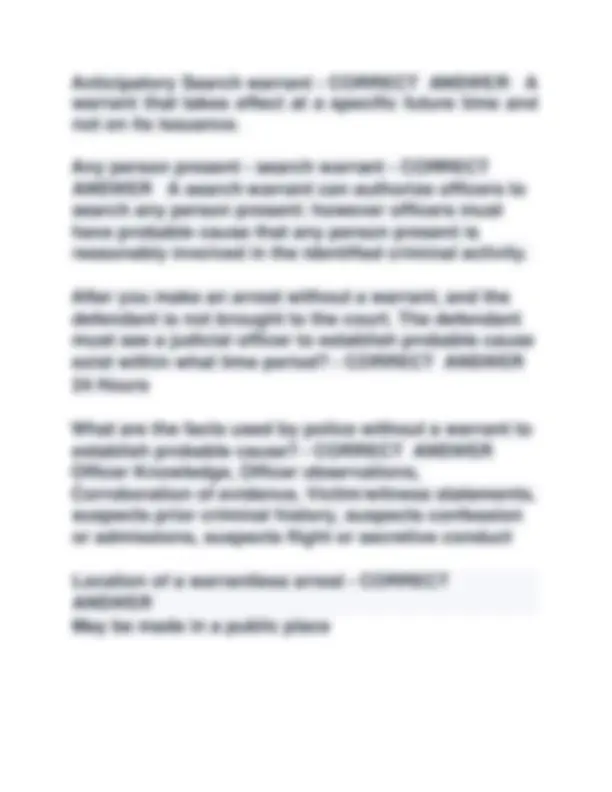
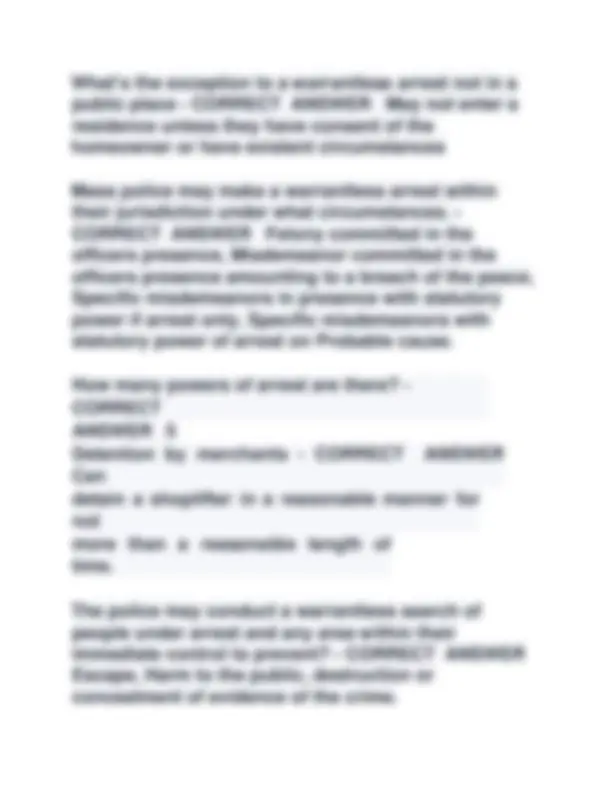
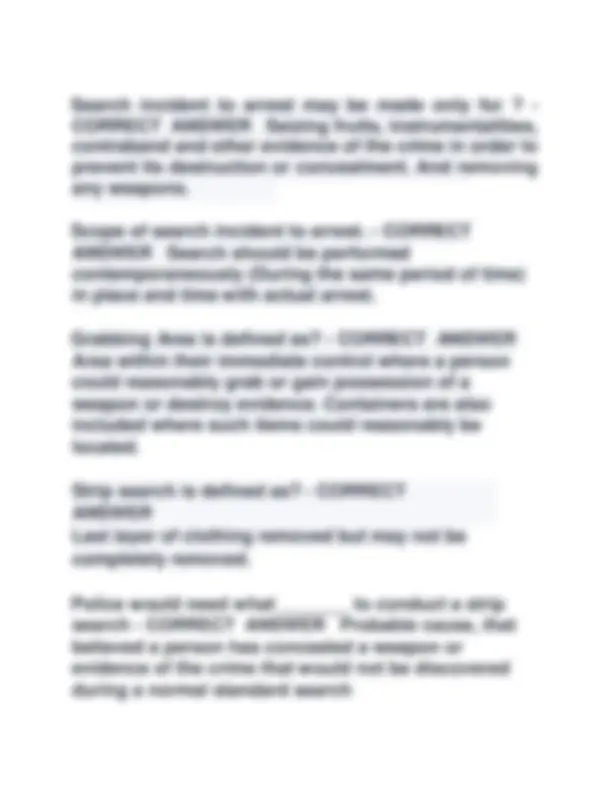
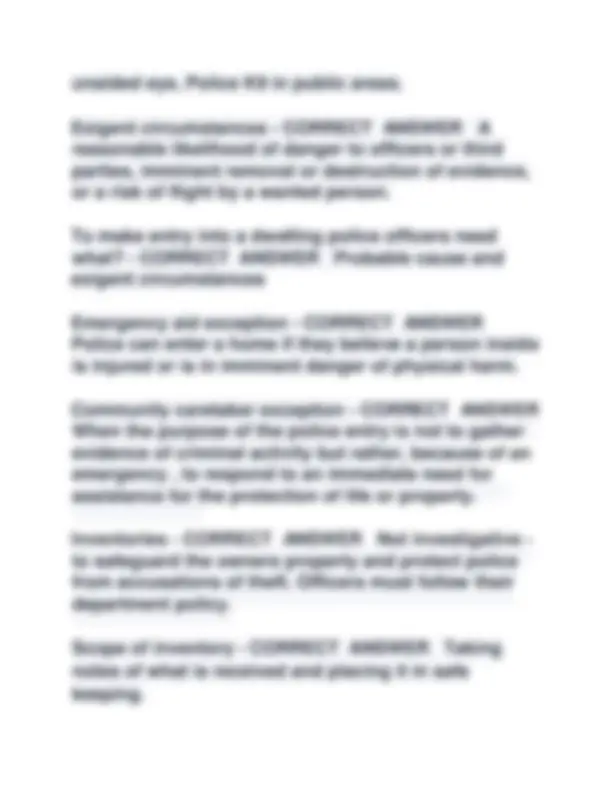
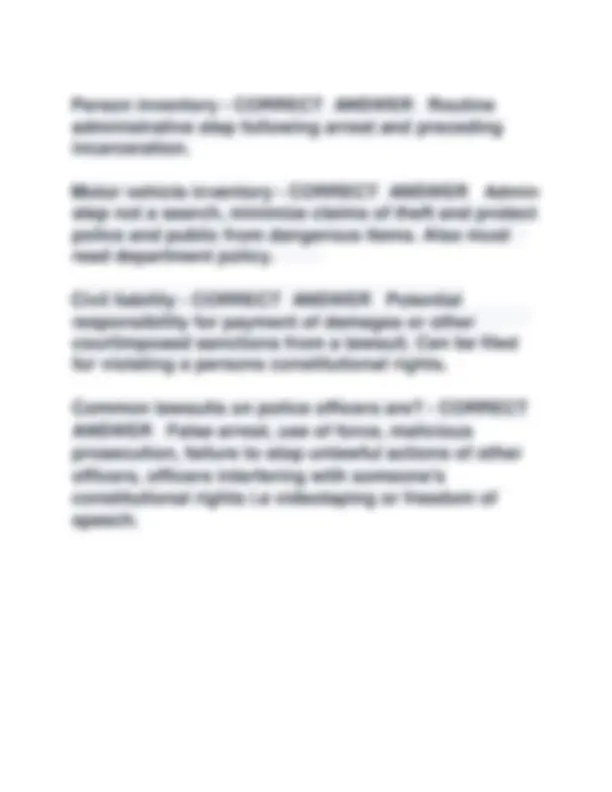


Study with the several resources on Docsity

Earn points by helping other students or get them with a premium plan


Prepare for your exams
Study with the several resources on Docsity

Earn points to download
Earn points by helping other students or get them with a premium plan
Community
Ask the community for help and clear up your study doubts
Discover the best universities in your country according to Docsity users
Free resources
Download our free guides on studying techniques, anxiety management strategies, and thesis advice from Docsity tutors
A concise overview of key concepts in constitutional law, focusing on the bill of rights and its amendments. It covers definitions and applications of fundamental rights such as freedom of speech, religion, the right to bear arms, and protection against unreasonable searches and seizures. The document also addresses legal standards like reasonable suspicion and probable cause, as well as the exclusionary rule and its exceptions. It serves as a study aid for understanding basic constitutional principles and legal procedures, offering clear explanations and correct answers to potential exam questions. This material is designed to help students grasp the essentials of constitutional rights and their implications in legal contexts. It is a valuable resource for anyone seeking to understand the foundations of constitutional law and the protections it affords individuals.
Typology: Exams
1 / 19

This page cannot be seen from the preview
Don't miss anything!












1st Amendment - CORRECT ANSWER Establishes freedom of religion,speech,press,assembly, and petition. Definition of religion under the 1st amendment - CORRECT ANSWER Citizens have the right to worship a god or supreme being (Or not to hold such beliefs). The government can not require or force observations or compel citizens to follow any particular religion. Definition of Speech under the 1st amendment - CORRECT ANSWER Protected speech includes spoken and written words, the act of not speaking and symbolic conduct. What are the following types of speech not protected by the 1st amendment. - CORRECT ANSWER Obscenity, fighting words, threats, incendiary speech.
2nd Amendment - CORRECT ANSWER Establishes the right to keep and bear arms. Intended to keep and protect the individuals right to possess personal firearm for lawful purposes. 4th Amendment - CORRECT ANSWER Prohibits unreasonable searches and seizures by the government. Definition of a Search - CORRECT ANSWER Physical invasion or intrusion of privacy by police on people, homes or personal property to obtain info or gather evidence. Definition of a seizure - CORRECT ANSWER When police take possession of property, make an arrest, or restrict a persons ability to move freely. 5th Amendment - CORRECT ANSWER Prohibits citizens from being punished for the same offense twice (Double Jeopardy) from being compelled to testify against themselves (Self-Incrimination) provides the right to indictment for certain types of offenses by a grand jury and guarantees due process of law. 6th Amendment - CORRECT ANSWER Requires all persons charged with a crime be informed of charges against them. People charged with a crime have a
articulates the rights of all residents. Mass Constitution Article 12 (XII) Definition - CORRECT ANSWER No Subject shall be held to answer for any crimes or offense, until the same is fully and plainly, substantially and formally, described to him; or be compelled to accuse, or furnish evidence against him. And no subject shall be arrested, imprisoned, despoiled, or deprived of his property, immunities, or privileges, put out of the protection of the law, exiled, or deprived of his life, liberty, or estate , but by the judgement of his peers, or the law of the land. Mass constitution Article 14 (XIV) - CORRECT ANSWER Every subject has a right to be secure from all unreasonable searches, and seizures, of his person, his house, his papers, and all his possessions. Statutory Law - CORRECT ANSWER Written and enacted by legislative branches of state or federal governments. Declare, command, or prohibit something. Case Law - CORRECT ANSWER Decisions by federal and mass courts, primarily the U.S. Supreme Court, the SJC, and Mass appeals court.
Objective - CORRECT ANSWER "Others" - What a reasonable person would do, act, or believe Subjective - CORRECT ANSWER "Self" - What an individual person did or believed Reasonable Suspicion - CORRECT ANSWER Must be based on specific and articulable facts which, when taken together, would convince a person of reasonable caution to believe that a person has committed, is committing, or is about to commit a crime. Probable Cause - CORRECT ANSWER Trustworthy facts and circumstances sufficient to convince a person of reasonable caution to believe that it is more likely than not. Probable Cause - in the case of a search. - CORRECT ANSWER A specific item subject to seizure will be found in the place to be searched. Probable Cause - in the case of an arrest - CORRECT ANSWER A crime has been committed and the person to be arrested has committed it. Collective Knowledge - CORRECT ANSWER Knowledge of one is the knowledge of all. Information held by one may be used to establish reasonable
Attenuation/Purging the taint - CORRECT ANSWER When unlawful police action leads indirectly to discovery of evidence or subsequent events reduce the impact of the unlawful action the court may decide that the evidence was so removed from the misconduct that it will not be suppressed. Voluntary Encounters - CORRECT ANSWER Police do not need any legal justification to approach, talk with, or ask questions of any citizens in a public place, so long as the citizen is willing to listen and voluntarily answer. Investigative stops/Threshold inquires/Terry stops - CORRECT ANSWER Short duration warrantless seizures used to determine if probable cause exist, specifically if a crime has or will be committed Example of Investigative stops/Threshold inquires/ Terry stops - CORRECT ANSWER When a officer through words or conduct, objectively communicated that the officer will use their police power to coerce the person to stay. I.E - Taking someone's ID, using an authoritative tone, activating lights. Investigative stop/Threshold inquire/Terry stop Limitations - CORRECT ANSWER Degree of force, Duration, Scope, Location, Questioning, and inferences.
Moto Vehicle exit orders are justified where: - CORRECT ANSWER Belief that the safety of the officers or other is threatened, Reasonable suspicion of criminal activity, police are conducting a search of MV on other grounds. Frisks - CORRECT ANSWER Warrantless and limited searches of a persons outer clothing and other areas in his immediate control for weapons and not evidence. What is the legal standard needed to justify a frisk? - CORRECT ANSWER Reasonable Suspicion What is the legal standard needed to justify a investigative search? - CORRECT ANSWER Probable Cause Specific and articulable facts that would support a frisk include: - CORRECT ANSWER Ofc. Observations, Ofc. Training/Experience, Suspects conduct/mannerisms, Crime being investigated, Suspects background + with other factors, Suspects admission that he has anything dangerous on him. Definition of Arrest - CORRECT ANSWER Seizure that initiate criminal prosecution.
Massachusetts Municipal police can do what with an arrest warrant. - CORRECT ANSWER Officers may arrest on a warrant anywhere in the commonwealth of MA. Fresh Pursuit into Massachusetts from an outside state - CORRECT ANSWER Allows an out of state officer in fresh pursuit of a suspect who has committed a felony in their state to pursue the suspect in MA in order to arrest that person Police need a warrant to search Reasonable expectations of privacy areas, these areas include: - CORRECT ANSWER Body, Home, Curtilage, Personal property, Place of business, electronic devices Curtilage - CORRECT ANSWER Is the immediate area surrounding a dwelling that generally includes driveways, gardens, decks, swimming pools, garages, and storage sheds. Police may conduct searches and seize times without a warrant when "No reasonable expectation of privacy" exist. What are these examples? - CORRECT ANSWER Property that has been discarded, abandoned, or left in plain view Areas not part of the Curtilage - CORRECT ANSWER Open fields, Abandoned property, Real property,
Garbage Search Warrant - CORRECT ANSWER Written documents issued by Massachusetts judicial officials that empower officers to search, without consent and by force if needed, a defined place for people or evidence of a crime. Issuing Authority and jurisdiction of a search warrant - CORRECT ANSWER In Massachusetts this includes Judges, clerk magistrates and assistant clerk magistrates of the superior court and district court. Jurisdiction - CORRECT ANSWER Specific geographical area or territory where a police officer, constable, or other authorized MA official can arrest or serve processes, provided they are in uniform or displaying a badge of office. Application for search warrant needs a detailed affidavit including: - CORRECT ANSWER Statement of probable cause showing property, articles and person to be seized, Detail of premises, detail of property, articles, vehicles, or person to be seized. Probable cause affidavit - CORRECT ANSWER It links people, place, and property identified to specific crimes.
Anticipatory Search warrant - CORRECT ANSWER A warrant that takes effect at a specific future time and not on its issuance. Any person present - search warrant - CORRECT ANSWER A search warrant can authorize officers to search any person present: however officers must have probable cause that any person present is reasonably involved in the identified criminal activity. After you make an arrest without a warrant, and the defendant is not brought to the court. The defendant must see a judicial officer to establish probable cause exist within what time period? - CORRECT ANSWER 24 Hours What are the facts used by police without a warrant to establish probable cause? - CORRECT ANSWER Officer Knowledge, Officer observations, Corroboration of evidence, Victim/witness statements, suspects prior criminal history, suspects confession or admissions, suspects flight or secretive conduct Location of a warrantless arrest - CORRECT ANSWER May be made in a public place
What's the exception to a warrantless arrest not in a public place - CORRECT ANSWER May not enter a residence unless they have consent of the homeowner or have existent circumstances Mass police may make a warrantless arrest within their jurisdiction under what circumstances. - CORRECT ANSWER Felony committed in the officers presence, Misdemeanor committed in the officers presence amounting to a breach of the peace, Specific misdemeanors in presence with statutory power if arrest only, Specific misdemeanors with statutory power of arrest on Probable cause. How many powers of arrest are there? - CORRECT ANSWER 5 Detention by merchants - CORRECT ANSWER Can detain a shoplifter in a reasonable manner for not more than a reasonable length of time. The police may conduct a warrantless search of people under arrest and any area within their immediate control to prevent? - CORRECT ANSWER Escape, Harm to the public, destruction or concealment of evidence of the crime.
A visual body cavity search requires what? - CORRECT ANSWER Probable cause - and no touching Manual body cavity search with some degree of touching requires? - CORRECT ANSWER A Search warrant - with strong showing of particularized need supporting high degree of probable cause that contraband is hidden inside the cavity. Motor vehicle searches incident to arrest - CORRECT ANSWER May be made only for the purposes of seizing fruits, instrumentalities, contraband and other evidence in order to prevent its destruction or concealment, and removing any weapons. Protective sweeps - CORRECT ANSWER Limited, warrantless searches to conduct a cursory check of a premises for people only, not evidence. Automobile exception - CORRECT ANSWER Motor vehicles make it easier to remove, destroy, or relocate evidence. If probable cause exist to believe evidence of a crime is inside a MV, and the vehicle is located on a public place it allows officers to search inside the MV where the evidence could reasonably be, including the trunk, without a warrant.
Consent search - CORRECT ANSWER A person allows officers to search places where the person consenting as a reasonable expectation of privacy. For consent to be valid - CORRECT ANSWER Person must have the authority to consent and must do so voluntarily. Actual authority is defined as? - CORRECT ANSWER Person lives in the home with shared access to the home or the person has a written contract that specifically empowers that person to allow officers to search. Apparent authority - CORRECT ANSWER When a officer makes a faulty judgment about someone's actual authority over the home. Mistake must be reasonable. Plain view doctrine - CORRECT ANSWER Allows police to seize evidence of a crime without a search warrant when officers are lawfully present in a place and clearly see items that are contraband or evidence of a crime out in the open. Plain view with special devices - CORRECT ANSWER Binoculars and flashlights, aircrafts may be used if made from lawful navigable airspace using the
Person inventory - CORRECT ANSWER Routine administrative step following arrest and preceding incarceration. Motor vehicle inventory - CORRECT ANSWER Admin step not a search, minimize claims of theft and protect police and public from dangerous items. Also must read department policy. Civil liability - CORRECT ANSWER Potential responsibility for payment of damages or other courtimposed sanctions from a lawsuit. Can be filed for violating a persons constitutional rights. Common lawsuits on police officers are? - CORRECT ANSWER False arrest, use of force, malicious prosecution, failure to stop unlawful actions of other officers, officers interfering with someone's constitutional rights i.e videotaping or freedom of speech.